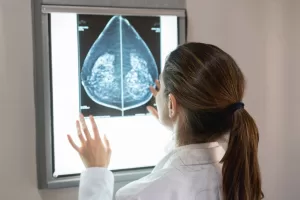The Role of Mammograms in Detecting Breast Cancer Early
As you consider your health and well-being, breast cancer screening should be a top priority. Mammograms play a crucial role in detecting breast cancer early, when it’s most treatable. This imaging test can identify abnormalities in breast tissue before they become palpable or cause symptoms. By undergoing regular mammograms as recommended by your healthcare provider, you significantly increase your chances of early detection and successful treatment. In this article, you’ll learn about the importance of mammograms, how they work, when to start getting them, and what to expect during the procedure. Understanding this vital screening tool empowers you to take control of your breast health.
Breast Cancer Screening
Breast cancer detection through regular screening is crucial for early intervention and improved outcomes. Mammograms are the most effective tool for identifying breast cancer in its early stages, often before symptoms appear. The mammogram benefits include reduced mortality rates and increased treatment options. For average-risk women, biennial screening mammography is recommended between ages 40 and 74. However, women at higher risk may require more frequent screenings or additional imaging techniques. Regular screenings empower women to take proactive steps in managing their breast health.
What is Breast Cancer Screening?
Breast cancer screening is a crucial process for detecting breast cancer before any symptoms appear. It involves various tests and examinations designed to identify potential signs of cancer early when it’s most treatable. The primary method of screening is mammography, which uses X-rays to create detailed images of breast tissue.
Regular screenings are essential for maximizing the mammogram benefits, as they can detect abnormalities years before physical symptoms develop. Other screening methods may include clinical breast exams and, for high-risk individuals, breast MRI scans.
Breast Cancer Screening Recommendations
Regular mammograms play a crucial role in breast cancer detection, offering significant mammogram benefits for early diagnosis. The U.S. Preventive Services Task Force now recommends biennial screening for women aged 40-74. This change aims to address rising cancer rates in younger women and reduce screening disparities, particularly for Black women who face higher mortality risks. While mammograms are essential, it’s important to discuss personalized screening plans with your healthcare provider, considering individual risk factors and potential supplemental screening methods.
Types of Breast Cancer Screening Tests
Mammograms: The Gold Standard
Mammography is the most common breast cancer screening test, capable of detecting tumors before they’re palpable. This x-ray examination is crucial for early breast cancer detection, significantly improving treatment outcomes. Modern variations include digital and 3D mammograms, enhancing diagnostic accuracy.
Advanced Imaging Techniques
For high-risk individuals, breast MRI offers additional screening benefits. This technique uses magnets and radio waves to create detailed breast images. Other emerging technologies like abbreviated breast MRI and contrast-enhanced mammography show promise in improving mammogram benefits, especially for women with dense breast tissue.
Benefits and Risks of Breast Cancer Screening
Mammograms play a crucial role in breast cancer detection, offering both advantages and potential drawbacks. Studies show that regular screening can reduce breast cancer mortality by 12-29% compared to no screening. However, it’s important to consider the risks, including false-positive results and overdiagnosis. According to the CDC, these factors can lead to unnecessary anxiety and additional testing. Ultimately, the decision to undergo mammogram benefits should be made in consultation with a healthcare provider, weighing individual risk factors and preferences.
Mammograms for Breast Cancer Detection
Mammograms play a crucial role in breast cancer detection, offering a powerful tool for early diagnosis. According to the CDC, women aged 40-74 at average risk should get a mammogram every two years. These x-ray images can reveal tumors before they’re palpable, significantly improving treatment outcomes. While mammograms provide substantial benefits, it’s important to discuss potential risks with your healthcare provider. Regular screenings, combined with breast self-awareness, form a comprehensive approach to breast health.
How Mammograms Help Detect Breast Cancer Early
Mammograms play a crucial role in breast cancer detection by providing detailed x-ray images of breast tissue. These screenings can identify tumors and abnormalities before they become palpable, enabling earlier diagnosis and treatment. Regular mammograms are essential for women over 40, as they significantly improve the chances of detecting breast cancer at its most treatable stages. The benefits of mammogram screening include reduced mortality rates and increased detection of early-stage cancers, making them an invaluable tool in the fight against breast cancer.
Conclusion
In conclusion, mammograms play a vital role in the early detection of breast cancer, potentially saving countless lives. By undergoing regular screenings as recommended by your healthcare provider, you empower yourself to take control of your breast health. Remember that while mammograms are an essential tool, they are most effective when combined with clinical breast exams and awareness of your own body. Should you have any concerns or notice changes in your breasts, do not hesitate to consult your doctor promptly. By staying vigilant and proactive about breast cancer screening, you significantly improve your chances of early detection and successful treatment if necessary.
Disclaimer: The content for this article is for informational purposes only and is not a substitute for professional medical advice, diagnosis, or treatment. Always consult your oncologist with any questions regarding a medical condition. Do not disregard medical advice or delay seeking it based on information from this site.

